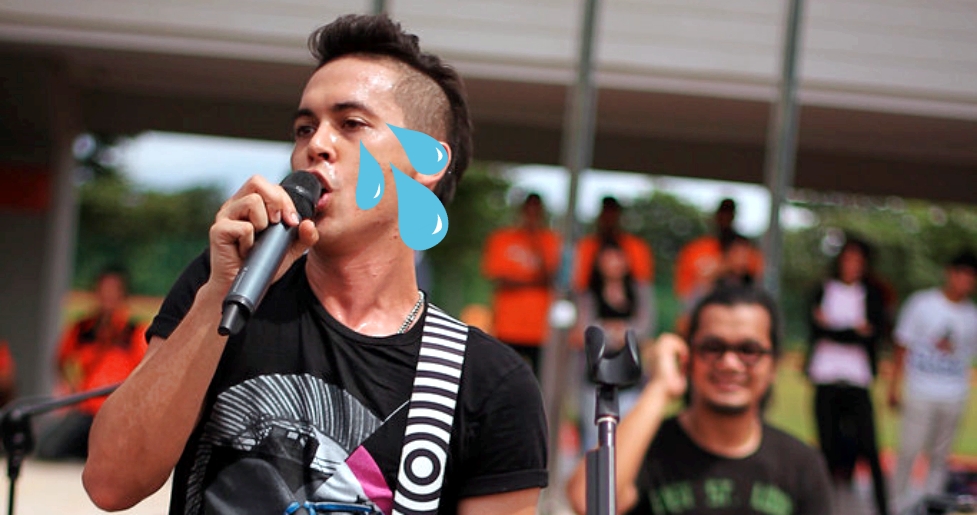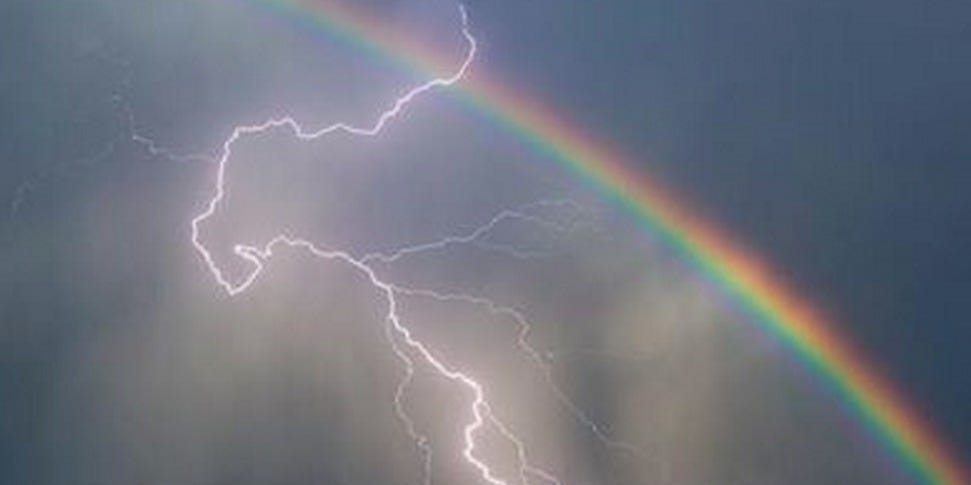Sam Bunkface Just Needs a Goddamn Hug

By Faris Saad
Add the letters ‘LGBT’ to any Malay-language content, and you’re guaranteed clicks, likes, and comments. According to sources, LGBTs are folks to be made fun of, they aren’t real. They don’t have lives, and they definitely don’t love. At the end of the day, LGBT folks just kembali ke pangkal jalan, however fucked up that jalan may be.
That’s why I was hesitant at first to listen to Bunkface’s new song “Akhir Zaman”. It’s at best, an upbeat, radio-friendly tune that a 13-year old might like.
From the title itself, I knew it was going to be a preachy song about The End Times. As a person assigned Muslim at birth by virtue of race, who is also transgender, I’ve been sung to and preached at so many times about The End Times. I know the script by heart.
Apocalypse now, then, forever.

As I listened to the lyrics, I ran through my mental checklist for stereotypical The End Times song clichés.
- Preaching about the afterlife? Check.
- Out of context Quranic verses? Check.
- LGBT as a sign of The End Times? Sigh. Double-check.
There is nothing new about this song. It doesn’t offer a fresh perspective or new approach to the issue raised i.e preparation for Judgement Day.
What the song did achieve was highlight the large number of Muslim Malay Men in the music scene who believe that LGBT people should be punished and they are the ones entitled to carry out that punishment. Like mushrooms after a wet spell, these anti-LGBT comments sprouted all over social media after the song’s release.
The common justification for homophobia is to prevent armageddon. I don’t see the logic. LGBT folks have been around longer than Islam itself. Does that mean we’ve always been in The End Times and have never seen Normal Times?
I initially responded with troll comments and posts, but as I thought more and more about the person behind the song, the less angry I became. I regretted making fun of Bunkface. I also forgot that comments, regardless of content, adds to YouTube revenue. Damn.
The burden of the Malay Muslim Man

The majority of anti-LGBT comments on Bunkface’s posts come from a certain category of Malay Muslim Men. As they feel they have the right to tell people to go to hell, “righteous” is the best word to describe them.
From birth, these men have a huge burden to bear. As a Righteous Malay Muslim Man, you are expected to:
- Never cry, show that you are hurt, or any kind of emotion except anger.
- Never ask for help because that shows you are weak.
- Guide your family to heaven by any means possible, including telling your girlfriend she needs to wear the hijab when you are married and to stop having man friends, while you can keep texting that female colleague.
- Tell women how to dress because rape is their fault.
These men were raised as the “better” gender by parents who didn’t know any better. They were given privileges they did not work for. They were told that it is their duty to save others around them from going to hell. They were treated like kings by the women around them because they supposedly hold the key to heaven. The Righteous Malay Muslim Man is someone one aspires to be.
It is not the fault of these men — they were raised that way in an environment that encouraged it — but it is their fault if they choose to stay oblivious. Some Malay Muslim Men have broken free of this cycle, but they are a minority swimming against the current.
This upbringing and the toxic masculinity it inculcates, along with a newfound religious fervour can result in extremism, and we see guys like Sam heading that way. Evangelise!! Evangelise angrily!!
This form of masculinity is unhealthy, but many Malay Muslim Men refuse to acknowledge the fact. To acknowledge that is to accept that they do not deserve all the privileges that come with being a Malay Muslim Man, stripping them of the only identity they have ever known. This could be why they tend to be very defensive when called out for their toxic behaviour. This could also be why they hate trans women with a frightening zeal. Like, why would anyone willingly give up their privileges to be… a woman?
The pain behind the angst

To understand the song, I needed to understand Sam, the songwriter. I didn’t think my DM’s would be entertained, so I did some online research like a real groupie.
Here’s what I found out from the tabloids: In January 2019, Sam got divorced from his wife of four years. The news was only made public by his ex-wife months later.
I don’t know the story behind the divorce, but it must have been a struggle for everyone, including his little kid. Everything breaks down, and you have to learn to lead separate lives again, this time with a lot of emotional baggage.
In a video, he was asked by a gossip journalist why he waited so long to make the announcement. Another asked when he will remarry. I could sense he was uncomfortable but felt obligated to answer. It must be horrible to have the most painful parts of your private life on display for everyone’s entertainment and then have people ask you that as though you owed it to them.
Looking for god but finding hate instead
Sometimes, when people go through hard times, they turn to God. We’ve been told it would solve all our problems. The problem is the Quran has many verses that can easily be misunderstood or taken out of context.
Surah al-Asr (The Declining Day), from where Sam took the words and inspiration for the lyrics, “Demi masa, sila gunakan akal,” says, “By time, indeed Man is in a loss except for those who have believed and done righteous things and advised each other to truth and advised each other to patience.” It just means, “Hey guys, let’s remind each other to be patient and do good things”. It does not justify condemning others to hell.
The other surah from which Sam took inspiration was al-Kafirun (The Disbelievers), “Engkau agamamu, aku agamaku.” The rest of the surah actually says that Muslims should be tolerant of others’ differences and beliefs. You do your thing, I’ll do mine and we’re cool.
Sometimes we forget that we need to read the Quran through a lens of compassion. We’re only human, after all. You won’t be judged by how many LGBT folks you’ve condemned to hell, but by how you’ve tried to make someone else’s life better. In this context, standing up for someone, straight or gay, will make you a better Muslim.
Sam must have found some solace in faith during this dark period in his life, but a holy book cannot offer you a shoulder to cry on, or the warmth and comfort of a hug. There is a lot of anger in “Akhir Zaman”, but maybe a lot of it comes from feeling helpless or lost and needing to blame it on something, anything.
We’re here for you, Sam
Since his divorce, he has moved into his dad’s home and shares custody of his kid with his ex-wife. He takes care of his dad, and sometimes it’s three generations of men hanging out in one house. It must be difficult sometimes, taking care of your dad and your kid on your own.
Sam, you don’t want your kid to grow up in an environment where hate is encouraged. You don’t want him to be unable to express when he is sad or in pain. You want him to love and be loved and unashamed of who he is.
That’s all I have to say about that song. After all that, I could be wrong. Sam could just be a jerk, but it feels nicer to assume he isn’t. Maybe he just needs a hug. (after he takes down that shitty song).
Faris Saad is a freelance business journalist and member of queer band Shh…Diam! He is in his mid-30s and is still not a rich rock star.
See here to learn how to report the song:

